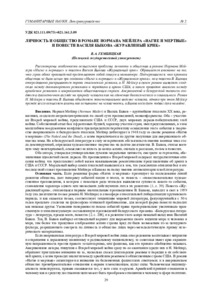Please use this identifier to cite or link to this item:
https://elib.psu.by/handle/123456789/1639Full metadata record
| DC Field | Value | Language |
|---|---|---|
| dc.contributor.author | Гембицкая, В. А. | - |
| dc.date.accessioned | 2014-03-28T08:32:54Z | - |
| dc.date.available | 2014-03-28T08:32:54Z | - |
| dc.date.issued | 2014 | - |
| dc.identifier.citation | Вестник Полоцкого государственного университета. Серия A, Гуманитарные науки: научно-теоретический журнал.- Новополоцк, 2014. - № 2. - С. 29-36. | ru_RU |
| dc.identifier.issn | 2070-1608 | - |
| dc.identifier.uri | https://elib.psu.by/handle/123456789/1639 | - |
| dc.description | Man and Society as Presented in the Novel “The Naked and the Dead” By Norman Mailer and the Story “The Cry of the Crane” By Vasil Bykau / Гембицкая Вера Адамовна (Полоцкий Государственный Университет). Gembickaja Vera Adamovna (Polockij Gosudarstvennyj Universitet) | en |
| dc.description.abstract | Рассмотрены особенности осмысления проблемы личности и общества в романе Нормана Мейлера «Нагие и мертвые» и повести Василя Быкова «Журавлиный крик». Обращается внимание на то, что герои обоих произведений представляют собой социум в миниатюре. Подчеркивается, что критика общества не была целью при создании «Нагих и мертвых» и «Журавлиного крика», но в повести В. Быкова опосредованно раскрываются пороки сталинского режима, а Н. Мейлер в своем романе выявляет сходство между диктаторскими режимами и порядками в армии США, а затем проводит аналогии между армейским режимом и американским общественным строем. Американский и белорусский писатели схо-дятся в дуалистичном взгляде на природу человека как на единство биологического и социального. Роман Н. Мейлера и повесть В. Быкова объединяет экзистенциальное видение человека, однако при этом Мейлер прежде всего осмысляет власть как испытание на человечность, а Быков исследует подвиг духа на войне. = the article dwells on the understanding peculiarities of the problem of man and society as presented in the novel “The Naked and the Dead” by Norman Mailer and the story “The Cry of the Crane” by Vasil Bykau. the article draws attention to the fact that the characters of both works represent society in miniature. the criti-cism of society is emphasized not to have been the goal when “The Naked and the Dead” and “The Cry of the Crane” were being created. Still the vices of Stalinism are revealed in the story by V. Bykau. N. Mailer shows the similarity between dictatorial regimes and the customs in the USA Army and then makes parallels between the customs in the USA Army and the American social order. Both writers agree on the dualistic nature of man, who is considered to be the unity of the biological and the social. the existentialist view of man unites the novel by N. Mailer and the story by V. Bykau, but the American writer studies power as a humanity test and the Bela-rusian writer studies the act of Spirit in the war. | ru_RU |
| dc.language.iso | ru | ru_RU |
| dc.publisher | Полоцкий государственный университет | ru_RU |
| dc.relation.ispartof | Веснік Полацкага дзяржаўнага ўніверсітэта. Серыя А, Гуманітарныя навук | be_BE |
| dc.relation.ispartof | Herald of Polotsk State University Series A, Humanity sciences | en_EN |
| dc.relation.ispartof | Вестник Полоцкого государственного университета. Серия A, Гуманитарные науки | ru_RU |
| dc.relation.ispartofseries | Серия A, Гуманитарные науки;2014. - № 2 | - |
| dc.rights | open access | ru_RU |
| dc.subject | Литературоведение | ru_RU |
| dc.subject | американская литература | ru_RU |
| dc.subject | белорусская литература | ru_RU |
| dc.subject | творчество Н. Мейлера | ru_RU |
| dc.subject | творчество В. Быкова | ru_RU |
| dc.title | Личность и общество в романе Нормана Мейлера «Нагие и мёртвые» | ru_RU |
| dc.type | Article | ru_RU |
| Appears in Collections: | 2014, № 2 | |
Items in DSpace are protected by copyright, with all rights reserved, unless otherwise indicated.
